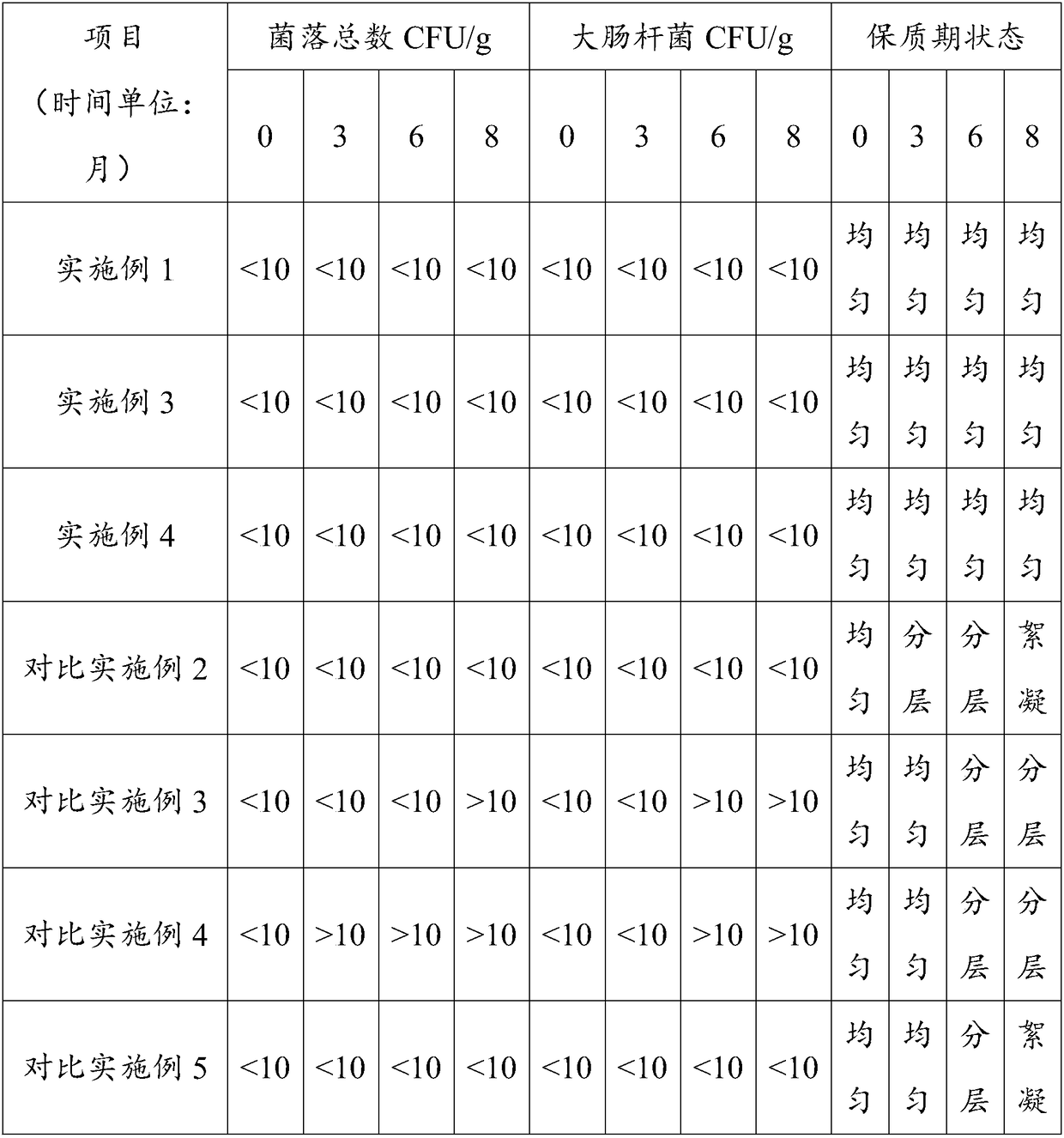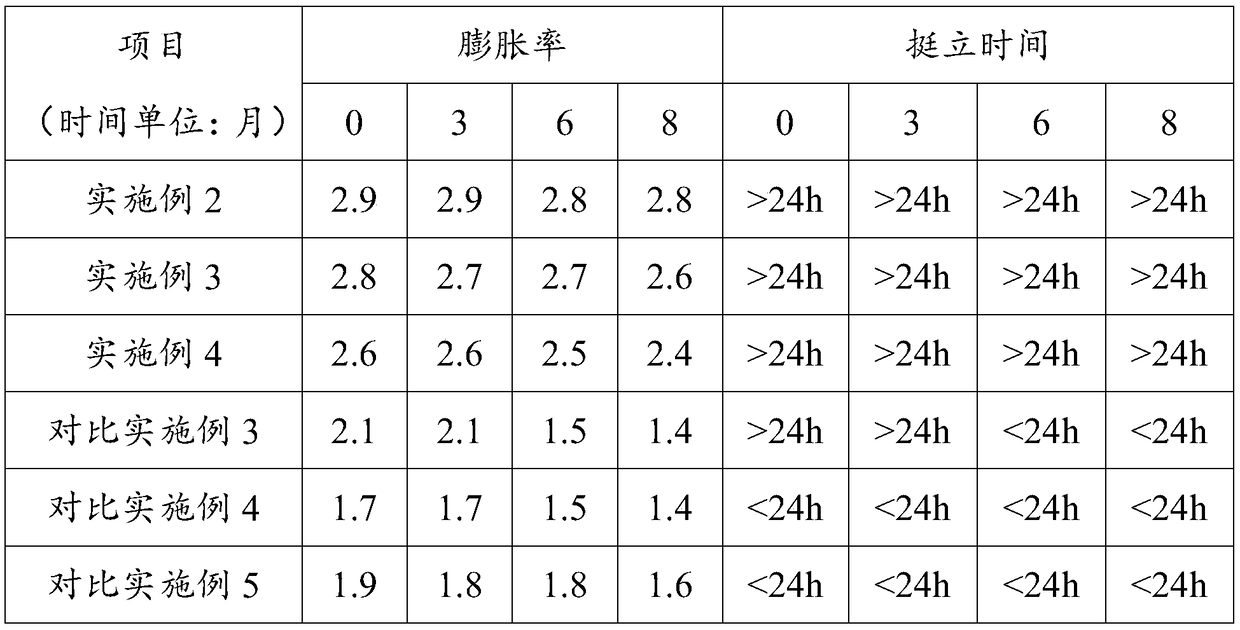Whipped coffee cream and making method thereof
A technology of cream and dosage, applied in cream preparations, dairy products, applications, etc., can solve problems such as doubts about products, and achieve the effects of improving whipping stability, excellent processing performance, and avoiding shear force.
- Summary
- Abstract
- Description
- Claims
- Application Information
AI Technical Summary
Problems solved by technology
Method used
Image
Examples
Embodiment 1
[0029] Raw materials used in this example: 11 kg of raw milk (1 kg of cream quality after separation), 20 g of sodium carboxymethyl cellulose CMC, 18 g of sodium microcrystalline cellulose MCC, 4 g of mono- and diglyceride fatty acid esters, and 3 g of lactic acid fatty acid glycerides.
[0030] making process:
[0031] Raw milk heating→separation by separator→temporary storage tank insulation→adding CMC, MCC, mono-diglycerin fatty acid esters and lactic acid fatty acid glycerides→stirring→homogenizing①→entering VTIS steam direct injection sterilization→homogenizing②→cooling→ filling
[0032] 1. The temperature of the raw milk is raised to 55°C.
[0033] 2. Temporary cylinder insulation temperature 65°C
[0034] 3. Stir for 5 minutes after mixing in stabilizer and emulsifier.
[0035] 4. The pressure of homogeneous ① is 40bar.
[0036] 5. The VTIS steam direct injection sterilization condition is 145°C, 3s.
[0037] 6. The pressure of homogeneous ② is 40bar.
[0038] 7. ...
Embodiment 2
[0041] Raw materials used in this example: 12 kg of raw milk (1 kg of cream mass after separation), 30 g of sodium carboxymethyl cellulose CMC, 30 g of sodium microcrystalline cellulose MCC, and 5 g of fatty acid esters of mono- and diglycerides.
[0042] making process:
[0043] Raw milk heating→separation by separator→temporary storage tank insulation→adding CMC, MCC, mono-diglycerin fatty acid esters and lactic acid fatty acid glycerides→stirring→homogenizing①→entering VTIS steam direct injection sterilization→homogenizing②→cooling→ filling
[0044] 1. The temperature of the raw milk is raised to 50°C.
[0045] 2. Temporary storage cylinder insulation temperature 60°C
[0046] 3. Stir for 8 minutes after mixing in stabilizer and emulsifier.
[0047] 4. The pressure of homogeneous ① is 50bar.
[0048] 5. The VTIS steam direct injection sterilization condition is 150°C, 2s.
[0049] 6. The pressure of homogeneous ② is 50bar.
[0050] 7. Cool to 10°C
[0051] Get super ...
Embodiment 3
[0053] Raw materials used in this example: 11kg of raw milk (1kg of cream quality after separation), 12g of sodium carboxymethylcellulose CMC, 10g of sodium microcrystalline cellulose MCC, and 5g of lactic acid fatty acid glycerides.
[0054] making process:
[0055] Raw milk heating→separation by separator→temporary storage tank insulation→adding CMC, MCC, mono-diglycerin fatty acid esters and lactic acid fatty acid glycerides→stirring→homogenizing①→entering VTIS steam direct injection sterilization→homogenizing②→cooling→ filling
[0056] 1. The temperature of the raw milk is raised to 53°C.
[0057] 2. Temporary storage tank insulation temperature 64°C
[0058] 3. Stir for 3 minutes after mixing in stabilizer and emulsifier.
[0059] 4. The pressure of homogeneous ① is 20bar.
[0060] 5. The VTIS steam direct injection sterilization condition is 140°C, 5s.
[0061] 6. The pressure of homogeneous ② is 30bar.
[0062] 7. Cool to 8°C
[0063] Get super high temperature w...
PUM
 Login to View More
Login to View More Abstract
Description
Claims
Application Information
 Login to View More
Login to View More - R&D
- Intellectual Property
- Life Sciences
- Materials
- Tech Scout
- Unparalleled Data Quality
- Higher Quality Content
- 60% Fewer Hallucinations
Browse by: Latest US Patents, China's latest patents, Technical Efficacy Thesaurus, Application Domain, Technology Topic, Popular Technical Reports.
© 2025 PatSnap. All rights reserved.Legal|Privacy policy|Modern Slavery Act Transparency Statement|Sitemap|About US| Contact US: help@patsnap.com


